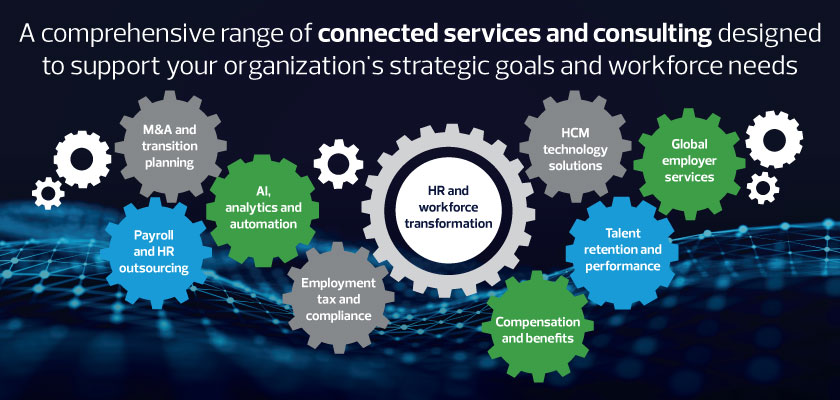Talent management is a strategic approach to attracting, developing and retaining skilled employees to meet your organizational goals. It involves practices such as recruitment, onboarding, training, performance management, organizational design, technology management and succession planning. Staying ahead of employment trends, tax changes and technology developments is crucial for optimizing operations, supporting business growth and enhancing the employee experience.
What is talent management?
Why is it important?
The importance of talent management lies in its powerful ability to support sustained growth, boost productivity, build an attractive employer brand and foster a healthy culture.

What do RSM’s talent management services include?
We deliver solutions that transform HR functions to meet modern workforce demands. Our HR Rapid Assessment® provides swift, actionable insights into your HR operations, and we design HR operating models that align with your goals and improve efficiency. Whether you seek to develop a long-term HR strategy or refine your organization’s career paths, our professionals empower your HR team to drive real, lasting change.
To deliver a technology solution that aligns with your business goals, we help you assess cutting-edge HR software, select the best option for your organization, and implement and optimize your system. Whether your goal is to integrate AI-driven analytics, support a remote workforce or enhance the employee experience, RSM has the experience and insight to help you transform your HR function.
We leverage top-tier HR solutions to reduce manual processes, improve data accuracy and maintain compliance, turning your HR function into a strategic powerhouse.
Focusing on the heart of your organization—your workforce—we develop strategies to maximize performance and prepare your business for the future. We help you foster greater employee engagement, streamline procedures, drive innovation and manage change through workforce transformation, talent management and HR optimization.
Our comprehensive solutions focus on people, processes and technology, empowering your teams for long-term success.
Choosing the right compensation and benefits program to attract and retain talent is complex. Your strategy needs to be competitive, align with your business strategy and comply with changing regulations and tax policies.
We understand the tax, compliance and reporting challenges you face, and we can assist your business in planning and implementing tax-advantageous programs.
Beyond addressing your tax needs, we can coordinate a variety of beneficial services across your company, from auditing employee benefit plans to designing total rewards programs.
Workforce compliance is a year round, strategic discipline that covers the legal, tax and regulatory obligations shaping the employer employee relationship across the employee lifecycle.
By integrating compliance into HR, organizations can reduce risk and support sustainable growth and transformation.
For many organizations, hiring and retaining HR and payroll staff can be challenging. Maintaining compliance, managing employee information efficiently and prioritizing data security further complicate these tasks. Increasingly, companies are outsourcing HR and payroll functions to reclaim time for business growth.
RSM’s HR and payroll managed services leverage experienced professionals to help you boost operational effectiveness, reduce errors, mitigate risks and allow your staff to focus on core business objectives.
When initiating a business transaction or transition, it is essential to uncover potential risks, assess workforce dynamics and align your human capital strategy for maximum synergy.
Talent is the backbone of any organization. Our HR due diligence is a meticulous process that evaluates everything from organizational structure to talent management. It’s about understanding the human element in transactions, aligning talent strategies with business objectives and foreseeing potential HR challenges and opportunities.
When you have employees working in foreign jurisdictions, your tax responsibilities become increasingly complex. In addition to managing corporate and individual tax risks, you need to maintain compliance in areas such as immigration, payroll, labor laws and social taxes.
We can help you implement a global mobility program that meets your international compliance obligations while supporting your businesses needs and talent strategy.
AI is reshaping HR. RSM helps middle market leaders harness AI, analytics and automation to streamline operations, enhance decision-making and elevate employee experiences. From automating tasks to improving talent strategies, our advisors guide you through ethical, data-driven AI adoption—empowering HR to lead digital transformation with confidence.
What do RSM’s talent management services include?
We deliver solutions that transform HR functions to meet modern workforce demands. Our HR Rapid Assessment® provides swift, actionable insights into your HR operations, and we design HR operating models that align with your goals and improve efficiency. Whether you seek to develop a long-term HR strategy or refine your organization’s career paths, our professionals empower your HR team to drive real, lasting change.
To deliver a technology solution that aligns with your business goals, we help you assess cutting-edge HR software, select the best option for your organization, and implement and optimize your system. Whether your goal is to integrate AI-driven analytics, support a remote workforce or enhance the employee experience, RSM has the experience and insight to help you transform your HR function.
We leverage top-tier HR solutions to reduce manual processes, improve data accuracy and maintain compliance, turning your HR function into a strategic powerhouse.
Focusing on the heart of your organization—your workforce—we develop strategies to maximize performance and prepare your business for the future. We help you foster greater employee engagement, streamline procedures, drive innovation and manage change through workforce transformation, talent management and HR optimization.
Our comprehensive solutions focus on people, processes and technology, empowering your teams for long-term success.
Choosing the right compensation and benefits program to attract and retain talent is complex. Your strategy needs to be competitive, align with your business strategy and comply with changing regulations and tax policies.
We understand the tax, compliance and reporting challenges you face, and we can assist your business in planning and implementing tax-advantageous programs.
Beyond addressing your tax needs, we can coordinate a variety of beneficial services across your company, from auditing employee benefit plans to designing total rewards programs.
Workforce compliance is a year round, strategic discipline that covers the legal, tax and regulatory obligations shaping the employer employee relationship across the employee lifecycle.
By integrating compliance into HR, organizations can reduce risk and support sustainable growth and transformation.
For many organizations, hiring and retaining HR and payroll staff can be challenging. Maintaining compliance, managing employee information efficiently and prioritizing data security further complicate these tasks. Increasingly, companies are outsourcing HR and payroll functions to reclaim time for business growth.
RSM’s HR and payroll managed services leverage experienced professionals to help you boost operational effectiveness, reduce errors, mitigate risks and allow your staff to focus on core business objectives.
When initiating a business transaction or transition, it is essential to uncover potential risks, assess workforce dynamics and align your human capital strategy for maximum synergy.
Talent is the backbone of any organization. Our HR due diligence is a meticulous process that evaluates everything from organizational structure to talent management. It’s about understanding the human element in transactions, aligning talent strategies with business objectives and foreseeing potential HR challenges and opportunities.
When you have employees working in foreign jurisdictions, your tax responsibilities become increasingly complex. In addition to managing corporate and individual tax risks, you need to maintain compliance in areas such as immigration, payroll, labor laws and social taxes.
We can help you implement a global mobility program that meets your international compliance obligations while supporting your businesses needs and talent strategy.
AI is reshaping HR. RSM helps middle market leaders harness AI, analytics and automation to streamline operations, enhance decision-making and elevate employee experiences. From automating tasks to improving talent strategies, our advisors guide you through ethical, data-driven AI adoption—empowering HR to lead digital transformation with confidence.
Our talent management solutions include a comprehensive range of connected services and consulting designed to support your organization's strategic goals and workforce needs. This approach encompasses:
- HR and workforce transformation
- HCM technology solutions
- Global employer services
- Talent retention and performance
- Compensation and benefits
- Employment tax and compliance
- Payroll and HR outsourcing
- AI, analytics and automation
- M&A and transition planning

Our clients are an extension of our team. We come to understand and become part of their history. As a strategic resource for their team, by having access to the right answer at the right time, we empower them to function more confidently and successfully in their business.
RSM's unique, one-source support model provides targeted strategies that respond to global talent trends, evolving technologies, changing tax considerations and the need for middle market organizations to stay ahead in attracting, developing and retaining top talent.
Having access to integrated consulting and solutions across the full spectrum of people management is powerful. Our client-focused, global firm enables organizational agility and resilience, no matter how your business or external factors change. Our industry-informed advisors help your company:
- Mitigate risks by identifying and addressing skill gaps
- Remain agile to respond to new challenges
- Manage employment tax and compliance effectively
- Leverage the right HR technology
- Streamline processes to increase efficiency
Why choose RSM to support your people strategy?
As a leader in assurance, tax and consulting solutions for the middle market, RSM offers an experienced, knowledgeable team of professionals to provide connected services that facilitate success across the full talent management spectrum.
Case study
Blount Fine Foods discovers a shortcut to human capital management excellence
"Without the relationship with RSM, I wouldn’t have been able to make as big of an impact here. Part of the reason our HR team has been able to accomplish so much is that RSM is a shortcut to ensuring we are moving in the right direction and using time effectively. With RSM, you get a continual return on your investment."
- Kim Wingren, Manager of Human Capital Management, Blount Fine Foods

